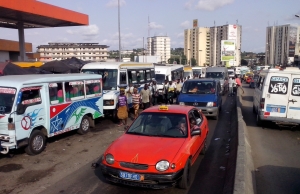West Africa is among the regions with the fastest growing population in the world: from 340 million to 800 million people by the middle of this century. Increasing industrialization and urbanization will lead to a rapid increase in the emission of trace gases and particles. An international team of scientists led by Peter Knippertz of Karlsruhe Institute of Technology (KIT) now warns of the risks posed by air pollution over the cities of West Africa. Among others, it could have an impact on regional climate. In their opinion, there is an urgent need for intensified research to better understand processes. The scientists now present their study in Nature Climate Change.
According to the study, the atmosphere above West Africa is still one of the least studied and understood on the planet, despite its central role for the health and economic well-being of the population. Experience gathered in other densely populated regions of the world, such as India or China, shows that a better understanding of the relationships of air pollution, climate, and regional impacts of worldwide climate change is needed for West Africa as well.
The climate of West Africa is largely characterized by a sensitive monsoon system which controls winds, temperature, clouds, and, most importantly, rain. Rapidly expanding cities, such as Lagos in Nigeria, Accra in Ghana, and Abidjan in Ivory Coast, are producing large amounts of harmful aerosols. “Increase in these smallest particles in the atmosphere may also affect cloud formation and solar irradiation, which in turn may lead to changes of rainfall and temperature,” climate researcher Professor Peter Knippertz of KIT says. Together with colleagues from the United Kingdom and France, he warns that people’s health, food security, and the climate of the region are at risk. For a better understanding of key processes, better observations and more reliable weather and climate models are needed, the scientists say. In their opinion, it is vital that any future policy advice is based on sound scientific observations.
“We need to collect further data on the atmosphere above West Africa to estimate the impact of air pollution – apart from that of worldwide climate change and changed land use due to intensified agriculture – on regional climate change” Knippertz says. “We need both continuous observation in the region and measurement campaigns with high-tech instruments, such as lasers and radars.“ Such a measurement campaign will take place next year as part of the DACCIWA (Dynamics-aerosol-chemistry-cloud interactions in West Africa) research project funded by the European Union, which will be led by Peter Knippertz and is the background of the present study.
Together with his colleague Andreas Fink, KIT, Peter Knippertz in particular studies cloud formation above Southern West Africa. In this region, both population growth and agricultural production are extremely high. “The low stratus clouds typical of West Africa are suspected to react sensitively to aerosol particles. Many particles produce more and smaller cloud droplets. This influences the way the clouds reflect solar irradiation and produce precipitation,” Knippertz explains. However, most climate models do not sufficiently reproduce clouds and effects on the monsoon cannot be explained appropriately. In-depth research is needed.
Reference:
Peter Knippertz, Mat J. Evans, Paul R. Field, Andreas H. Fink, Catherine Liousse, and John Marsham (2015): The possible role of local air pollution in climate change in West Africa. Nature Climate Change, DOI: 10.1038/nclimate2727
http://nature.com/articles/doi:10.1038/nclimate2727
More about the DACCIWA Project:
The DACCIWA project measures air quality and meteorology in West Africa and makes computer simulations to investigate the links between air quality, weather, and climate. DACCIWA is a collaboration of sixteen scientific institutions in Europe and Africa. Apart from Karlsruhe Institute of Technology, these are: Centre National de la Recherche Scientifique (CNRS), France; German Aerospace Center (DLR); ETH Zurich (ETHZ), Switzerland; European Centre for Medium-Range Weather Forecasts (ECMWF), UK; Kwame Nkrumah University of Science and Technology (KNUST), Ghana; Met Office, UK; Obafemi Awolowo University, Nigeria; University of Manchester and University of Reading, UK; Université Blaise Pascal Clermont-Ferrand II, Université Paris Diderot, Université Paul Sabatier Toulouse III., Université Pierre et Marie Curie, France; University of Leeds and University of York, UK.
More information: http://www.dacciwa.eu
More about KIT Climate and Environment Center: http://www.klima-umwelt.kit.edu/english
Being “The Research University in the Helmholtz Association”, KIT creates and imparts knowledge for the society and the environment. It is the objective to make significant contributions to the global challenges in the fields of energy, mobility, and information. For this, about 10,000 employees cooperate in a broad range of disciplines in natural sciences, engineering sciences, economics, and the humanities and social sciences. KIT prepares its 22,800 students for responsible tasks in society, industry, and science by offering research-based study programs. Innovation efforts at KIT build a bridge between important scientific findings and their application for the benefit of society, economic prosperity, and the preservation of our natural basis of life. KIT is one of the German universities of excellence.

